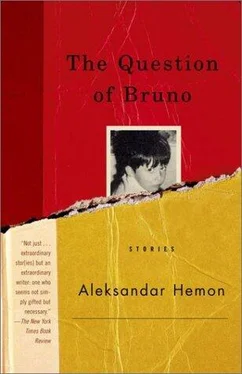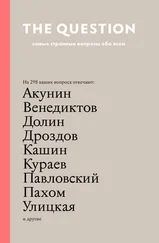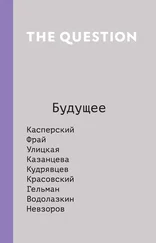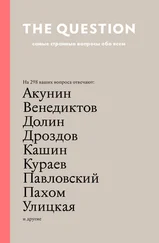And the moment before he was to step into the bathroom, its doors amicably opened, the steam speedily leaving it, a man walked into the apartment. For reasons inexplicable, Pronek didn’t slip into the bathroom (“Come in,” whispered the steam), but stood there, nude as a piglet, suddenly aware of the hairlessness of his chicken chest, and general grotesqueness of man’s frontal nudity, not to mention the gooey condom in his hand.
“Hi!” Pronek said.
“How’re you doin’?” the man said.
“Good.”
“Good.”
Silence.
“Who are you?” the man asked.
“I am Andrea’s friend.”
“I guess,” he said. “I’m Carwin.” He was fashionably unshaven and had unruly hair, which, to us, signified cynical rebelliousness. He wore an unbuttoned flannel shirt and a T-shirt underneath, with a picture of a crucified, blond angel.
“Are you Russian?” he asked.
Pronek’s bare feet were cold, so he put his left sole on his right calf, and stood there like a Masai warrior, with a used condom instead of a spear.
“No, I’m from Sarajevo, Bosnia,” Pronek said. “But we met in Ukraine.”
“Well, it’s nice to meet you,” he said. “I hope I’ll never see your fucking face again.” Then he hollered toward Andrea’s room: “Now you started bringing in fucking foreigners. American dick is not good enough for you, you fucking bitch!”
“Fuck you, you fucking Anglo asshole!” she yelled back.
It was then that Pronek finally slipped into the bathroom. The condom wouldn’t sink in the toilet bowl, so Pronek kept flushing it, but it would always come back up from the toilet throat, defiantly bobbing. A roll of toilet paper hid behind the toilet seat, like a frightened hedgehog. We can attest that Pronek felt profound helplessness at that moment. A jury of plastic bottles, bemused by the ablution he had to perform, was lined up on the shelf: Natural Care, Head & Shoulders, Happy, Antarctica, Morning Mist, Mud Miracle (Swiss Formula), No More Tangles. He looked into the mirror and saw vermilion dots on his face and sallow teeth and a square Slavic head with a flat pate and a tuber-nose and greasy hair, sticking to his low forehead. “What am I doing here?” he asked himself (Patience, dear fellow, patience). But there was nothing that could be done, there was nothing more inevitable than taking a shower at that moment.
Pennsylvania 1760
Perhaps it is important to know that Andrea was an artist, indeed a painter. She showed Pronek her most recent finished painting, a couple of years old, picturing her between a hog and a sow — all three of them stared at Pronek, framed, presumably, by a farm fence. The pigs were adamantly pink. The hog seemed to enjoy the situation and it had two dun marks on its front hams, while the sow had swollen teats. The painting was entitled Home. She informed Pronek, who could not decide whether he liked it or not, but said he liked it anyway, that she hadn’t painted anything after that. “There are things I need to understand about myself before I can share them with people,” she said.
She worked at the Art Institute, in the gift shop. In the mornings, she would suddenly erect her upper body in bed, the way maidens in horror movies wake up from torturous nightmares, just before the killer (who is always in the vicinity) leaps at them to slice them up. Then she would light a cigarette and look worried. Pronek could tell from the way she smoked that her life was an arduous task: her forehead would corrugate; she would slide her tongue between her gums and the inside of her lips, as if answers to all questions were hiding in oral corners along with food bits; she would wedge her elbow into the palm of her left hand, and prompt her right hand with a cigarette, close to her mouth, nibbling on the filter, inhaling in small, intense gasps, and then exhaling with a burdened, low sigh at the end, like a full stop. She would scratch her spine with her left-hand thumb, and her shoulder blades would move toward each other under the taut skin, only to retreat back to their starting positions.
Pronek would hear the delicate scraping of her long nail against the skin, and, still steeped in his nightmare, he would worry about her birthmarks being ripped off her back.
He would watch her stealthily, not making a sound. When she turned toward him, he would pretend to sleep, keeping his eyes and mouth closed, lest she kiss him, for he was ashamed of his putrescent morning breath. She would trudge to the bathroom, and he would hear the relentless hum of the shower, intermingled with splashing, as if she were resisting a deluge. Then the hair dryer buzz, after which, he suspected, she took care of her hair and her armpits and her lips. By the time she would come back to their room (albeit Pronek would have never referred to it as “our room”) he was asleep, and not even the bustle of her picking through her wardrobe, and the rustle of her rolling stockings up her legs would make him open his eyes.
He would get up a couple of hours later and then follow her scent to the bathroom, where she would still be vaporously present, and the bathtub would still have the unfortunate vestiges of her hair, curled up here and there, waiting to be collected in the mass grave of the drain. Pronek would perform his morning toilet duties, trying to make his body presentable to America. There were three toothbrushes, two of which — Pronek’s and Andrea’s — lay side by side, as if sunbathing together, while the third one was, incidentally, on the verge of the sink.
It was the third one that Pronek dipped in the toilet water.
On some mornings, Pronek would salvage a plate, not yet engendering mold patches, from the dish-swamp, and eat some limp cheese (invariably mozzarella) and rancid crackers. Sometimes he would sip coffee from a cup that had lipstick scars on the opposite side of the brim, and kept staring at a blank page, only to write “Chicago, April 1992” in the upper-right-hand corner and then stare again, until he would finally abort the letter. He could never go beyond the place and the date, as if those were perfectly self-explanatory, and nothing else need have been said. He wanted to call his parents, but had no money to pay for it, and Andrea had said that he should ask Carwin, since he was “the phone man of the house.” Sometimes he would watch the news, showing barricades, and people running in panic, and white, innocent, armored vehicles parked in the middle of a Sarajevo street.
On the days he didn’t go to work as a Pier 1 store manager, Carwin would get up and lodge himself on the sofa, stick his hand into his flannel shorts, and watch the news with our foreigner. He would say: “Man, I don’t understand this shit. Can’t they just chill out, man. I mean, what’s the big fucking deal?” Pronek would say nothing, stroking the purring Moskva, and then he would get on the downtown train to meet Andrea for lunch.
He would walk down the Magnificent Mile, sweating in his dark coat, dotted with lint, reeking of traveling and the past. Often, he would be thinking about The Magnificent Seven and Seven Samurai and there was nothing magnificent about the mile: morgue-like buildings and lugubrious stores promising all kinds of purchasable joys. Whenever he found himself walking down the Magnificent Mile, he had a burning craving for a McDonald’s burger, which he normally hated and considered inedible, respectively.
Perhaps this could be Pronek’s contribution to the psychology of architecture.
He would stroll past people clutching their purses or briefcases, frowning at the wind. “Who are they?” he wondered. “Where do they live? What do they do?” Once he realized, schlepping through the goo and yuck of wet April snow, that he was utterly superfluous walking down the Magnificent Mile, that everything would be exactly the same if the space his body occupied at that moment were empty — people would walk with the same habitual resolve, clutching the same purses and briefcases, perhaps even infinitesimally happier, because there would be more walking space without his body. When he shared his thoughts with Andrea, she said, with a nasty giggle: “The land of the free, the home of the brave.”
Читать дальше












